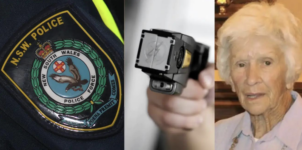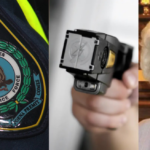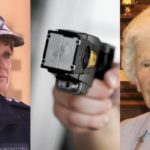Prosecution Appeals Against Judge’s Decision to Allow Killer Cop to Avoid Prison

The Office of the Director of Public Prosecutions (NSW) will file an appeal against the inadequacy of the sentence imposed on a police officer who avoided a prison sentence despite being convicted of manslaughter for fatally tasering a 95-year old great-grandmother at an aged care facility in southern New South Wales.
The incident
Now 35-year-old Kristian White was a senior constable when he attended Yallambee Lodge aged care facility in Cooma with another officer on 17 May 2023 in response to information that a resident was in possession of a knife.
The officers arrived and saw 95-year-old great-grandmother Clare Nowland, who weighed just 45 kilograms at the time, in a walking frame and holding a steak knife. She was reported to have been rambling, and it should have been clear she was suffering from a mental health episode. She was suffering from dementia at the time.
According to witnesses, including paramedics already at the scene, rather than attempt to de-escalate the situation or disarm her without using a weapon, senior constable White aggressively directed the frail elderly woman to drop the knife. When she failed to drop the cutlery item, the officer stated “just.. nah, bugger it” before deploying his taser twice – once into Mrs Nowland’s chest and another into her back.
The great-grandmother fell to the floor and fractured her skull, later dying in hospital as a result of her injuries.
The charges
After an internal inquiry found that the force used against Mrs Nowland was “grossly excessive”, officer White was charged with recklessly causing grievous bodily harm, assault occasioning actual bodily harm and common assault.
The charges were later upgraded on the advice of the Office of the Director of Public Prosecutions to include the offence of manslaughter, which carries a maximum penalty of 25 years in prison.
The trial
The jury trial took place in November 2024 in the Supreme Court of New South Wales.
After hearing all of the evidence as well as the judge’s directions on the law, the jury retired for its deliberations and ultimately found the defendant guilty of manslaughter.
The verdict came after an eight-day trial and 20 hours of deliberations, and represented a finding that the prosecution had proved beyond reasonable doubt that Mrs Nowland died as a result of the conduct of Mr White – disagreeing with the defence argument that the officer’s actions were a reasonable and proportionate response to the circumstances as he perceived them; in other words, that they were in self-defence of himself or another person.
The sentence
In a decision that has been widely criticised, on 25 March 2025 the sentencing judge ordered Mr White to comply with a two-year community correction order (a form of good behaviour bond) on the officer, which includes a requirement to undertake 425 hours of community service.
This meant that Mr White avoided prison despite manslaughter carrying a maximum penalty of 25 years in prison.
This is in the context of statistics published by the Judicial Commission of New South Wales setting out that 98.6% of all offenders convicted of manslaughter, receiving a sentence of full time imprisonment, with an average full term of 8.5 years and an average non-parole period (minimum term) of 4.5 years.
In fact, the statistics make clear that 100% of those found guilty of manslaughter after a trial – as was the case with Mr White – were sentenced to full time imprisonment.
The decision to appeal
In a move that has been welcomed by the Nowland family, a spokesperson for the Director of Public Prosecution (DPP) has told the media that:
“After careful consideration of the judgment, the director has determined to file an appeal against the inadequacy of the sentence imposed in this matter”.
The decision followed a public outcry that the sentence imposed on the officer was manifestly inadequate.
Crown inadequacy appeals
Appeals made by the DPP on the basis that a sentence is too lenient are referred to as Crown Inadequacy Appeals.
There is no statutory time limit for lodging these types of appeals.
However, prosecution guidelines issued by the DPP make clear that, following sentencing proceedings, prosecutors should promptly assess
In reaching a decision as to whether an inadequacy appeal should be made, prosecutors are required to consider:
- Whether the sentencing court made a material error of law or fact, misunderstood or misapplied proper sentencing principles, or wrongly assessed or omitted to consider some salient feature of the evidence, apparent from the remarks on sentence,
- Whether the manifest inadequacy of the sentence implies an error of principle,
- The range of sentences legitimately open to the sentencer on the facts, having regard to official statistics and comparable cases,
- The conduct of the proceedings to date, including the prosecution’s opportunity to be heard and the conduct of the case,
- Any element of double jeopardy,
- The appeal court’s residual discretion not to intervene by increasing the penalty, and
- Whether the appeal is likely to succeed.
The Guideline makes clear that prosecutors should bear in mind that:
- Prosecution/Crown appeals are and ought to be rare,
- The appellate court will only intervene only where there has been a material error of fact or law or the sentence that is manifestly inadequate,
- The appellate court will consider the advantages enjoyed by the sentencer which are denied to it, including hearing the entirety of the case and observing the witnesses,
- The appellate court will not be concerned whether or not it would have found the facts differently, but will consider whether or not it was open to the sentencer to find the facts as he or she did,
- The respondent will suffer a species of double jeopardy due to an appeal being made, which is undesirable;
- Apparent leniency or inadequacy alone may not be enough to justify a higher penalty,
- Scope must remain for the exercise of mercy by the sentencing court,
- The range of appropriate sentences is a matter on which reasonable minds may differ, and
- An appeal must be filed promptly.
The appeal hearing
Crown inadequacy appeals from the District or Supreme Court will come before a three-court bench of the New South Wales Court of Criminal Appeal (NSWCCA).
In order to succeed, the DPP will need to:
- Identify an error in the sentencing judge’s exercise of discretion (see House v The King (1936) 55 CLR 499 at paragraph 505), and
- Convince the appeal court that it should not exercise its residual discretion not to intervene, despite an error being identified (see CMB v Attorney General for NSW (2015) 256 CLR 346 at paragraph 54).
The NSWCCA will determine whether an error in the exercise of sentencing judge’s discretion – such as the imposition of a manifestly inadequate sentence – has occurred after considering all factors relevant to fixing a sentence.
The court will then decide whether it should intervene by adjusting the sentence; for example, by quashing the existing sentence and instead imposing a prison sentence.
If it is determined that a prison sentence should be imposed, the duration of the prison term will then be set.
Any prison sentence of 6 months or less will be a fixed term, and any sentence that is longer that 6 months will be comprised of a full term and a non-parole period (minimum term).







